British alt-rock band Bastille’s music has always felt like a dispatch from an alternate, dystopian reality, and their second album, “Wild World,” weaves it into the real world more than ever before. Their first album, 2013’s “Bad Blood,” brought the single “Pompeii” into charts across the world, reaching the top 10 in 15 countries. It would be their most successful single for five years, until their collaboration on “Happier” with Marshmello unseated it in 2018. Inspired by the volcanic eruption in the ancient Roman city of the same name, “Pompeii” is “an imaginary conversation between these two people who are stuck next to each other in their sort of tragic death pose,” frontman Dan Smith said in an interview. This source of inspiration and its execution would become Bastille’s signature artistic style.
The band’s discography has continued to embrace this darkness, even though the upbeat style of their music doesn’t always reflect it. From “Bad Blood,” to “Wild World” in 2016, to their third album “Doom Days” in 2019 and its reissue “Doom Days (This Got Out Of Hand),” the band has drawn inspiration from the current state of the world to create meaningful stories throughout their albums.
However, their second studio album, “Wild World,” brings listeners into the music in a more tangible way by using audio clips from television, film and even a United States Department of Justice informational video. By combining these samples with their apocalyptic moods and scenes, Bastille transitioned away from the fictitious storytelling of “Bad Blood” to something closer to a reflection of what the future holds based on the past.
“So, what would you little maniacs like to do first?” asks a female voice in “Good Grief,” the album’s first single and opening track. The recognizable voice is that of the movie character Lisa, a woman created by two awkward high schoolers in John Hughes’ 1985 film, “Weird Science.”
The film’s audio is used twice in the song: first before the drum kicks in and later during the interlude before the bridge, when Lisa says “If you want to be a party animal, you have to learn to live in the jungle. Now stop worrying and go get dressed.” Dialogue clips from pop culture moments are used in 11 out of the 19 songs on the complete version of the album, and may be found in the beginning, intermezzo or end of a track — a placement that is highly effective when combined with Bastille’s musical style.
The “Weird Science” quotes in “Good Grief” don’t necessarily lend to the dystopian feel of most of their music, and many of the other audio clips don’t either. Instead, they add to the energy of the tracks, like the perfectly placed “c’mon, relax” between the first chorus and second verse in “Snakes,” or the clips used in “Send Them Off!” during the intro and intermezzo. Rewritten or re-recorded from the Italian science fiction film “Cosmos: War of Planets” from 1977, the intro of “Send Them Off!” uses the quote “It was a slight on my honor, so he deserved it / But we’re talking about the most brilliant mind this world has ever seen!” that precedes a bold brass riff.
During the intermezzo, the words “Your mind exists somewhere altogether different; it lives in a world where feelings simply cannot be defined by words” can be heard following the bridge. These references serve two very different purposes in the song. The former lends itself to the high energy of the track that justifies the exclamation point in the title. The latter is one of the many quotes throughout the album that calls out the audience in a way that is almost unnerving.
Aside from the use of film and television quotes, Bastille’s main source of dialogue clips is informational videos. “Fake It,” which asks a lover to not “ turn over the page / We should rip it straight out / Then let’s try our very best to fake it,” begins with a quote from “Changing,” a 1971 short film from the “The Social Seminar” educational film series.
In contrast, “Winter Of Our Youth” laments the end of childhood and feelings of unpreparedness for adulthood with an opening quote from “Act Your Age,” a 1949 social guidance film for teenagers. “So the question is, why doesn’t he grow up? Why does he still behave as a child? How can we help him get rid of these leftovers from childish behavior?” asks a male narrator. Throughout the remainder of the song, Smith sings his worries about growing up as he reminisces about his youth so much that he misses the present moment.
“Four Walls (The Ballad Of Perry Smith)” also features a clip from “Changing,” which follows a recording stating “This is a collect call from Kansas State Penitentiary,” referencing the location where Perry Smith was imprisoned with Richard Hickock on death row for the murder of the Clutter family in Holcomb, Kansas.
The song, which addresses Perry Smith and Hickock’s time in prison and execution by hanging, seems to be a study on whether two wrongs — Perry and Hickock’s crimes and their penalty of death — make a right. The question calls to be reflected upon as Smith sings, “Now we’re faced with two wrongs / I don’t know.” While this song is one of the more hopeless tracks on “Wild World,” its contribution to the album’s overall tone and Bastille’s honest messages cannot be ignored. We carry what we do with us, right or wrong.
The final song on the deluxe version of “Wild West,” “The Anchor,” closes the album on a more positive note. The opening audio clip features dialogue between two subjects, taken from “What Did You Take? The Drug Abuse Emergency,” created by the New York State Department of Health in 1971.
One person explains how it’s impossible to describe things happening in their brain to another person, to which the second voice questions, “Why don’t you just try?” While the topic of the audio doesn’t match up with Smith’s songwriting, the clip seems to reflect his desire to translate the feeling of love into words. “You are the light that is blinding me / You’re the anchor that I tied to my brain / ’Cause when it feels like I’m lost at sea / You’re the song I sing again and again,” he sings in the chorus. The audio clip here seems to be a reflection of Smith’s inner thoughts before beginning to write “The Anchor,” creating an experience out of the song.
Bastille’s use of audio clips in “Wild World” is impressive not only because of the sheer quantity and range, but also because of how the band uses them to bring the past into the present. The second track of the album, “The Currents,” features an intermezzo with a quote from “Make Mine Freedom,” an anti-communist propaganda cartoon from the late 1940s. The song itself, which makes several references to swimming and breathing, was inspired by Brexit and the rise of politicians such as Donald Trump and Nigel Farage.
Holding the same tone, a later track, “Way Beyond,” features heavy political and social messaging. A spoken word intro asks “What the f— are y’all doing is the question / This is the question” leading Smith to sing “The animals break out their cages / Now chaos is raining down around us / But here we stand with our arms folded / Do you wanna be free of this?” The song makes numerous references to the numbness to tragedy that our current society has. The song also tackles the difficulties of distinguishing live news on television from fictional films as Smith repeats, “I’m gonna dust you off of my shoulders.”
The song’s outro features a quote from “The News Media’s Coverage of Crime and Victimization,” an informational video released by the United States’ Department of Justice in 1999. “Television viewers have the choice of watching the tragedy play out from the safety and comfort of their living rooms,” a male voice narrates, “but victims have to respond to the pressure of the media while still in shock.”
This video is also used as an intro to “Warmth,” which serves as a post-apocalyptic love song. “When the event happens, there is little time to think of those things that people would like to have remain private / Getting caught up in the circus-like atmosphere, feeling less responsible to conventional ethical practices” voices say from the video before Smith takes over singing.
He asks the subject to “hold me in this wild, wild world,” referencing the album’s title as he searches for an escape from everything happening around him. “I just keep talking about it / But I’ll do nothing about it / Tell me, did you see the news last night?” he asks, pointing out the performative activism that many take part in on social media without striving for real change in daily life — which has become an even larger conversation since the album’s release in 2016.
While “Wild World” is full of spoken word and dialogue clips, they don’t overwhelm the music or songwriting in any way. Instead, Bastille threads them through specific songs to complement their content and sound for an increasingly impactful listening experience. The clips allow each song to stand on its own in a unique context, and for “Wild World” to stand out as the band’s best work yet. Bold, cinematic and insightful, it continues to be as powerful four years after its release as it was when “Good Grief” first asked what we want to do next.


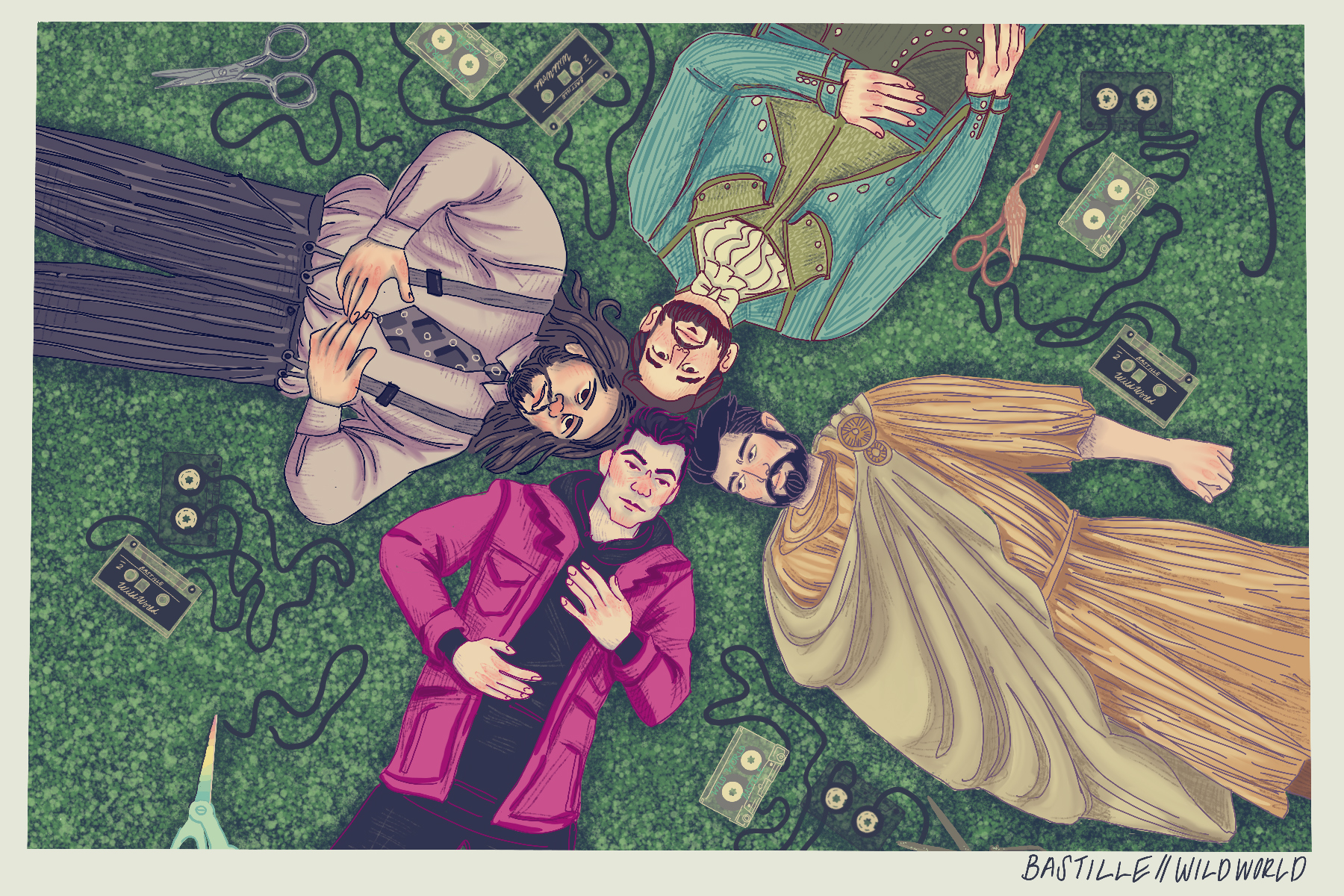


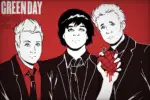

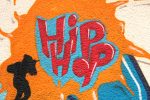

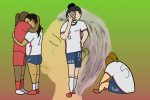
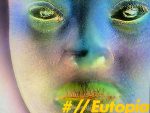
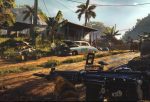
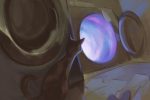





Great article. Learned so much information about the band i love. Thank you so much Julia.